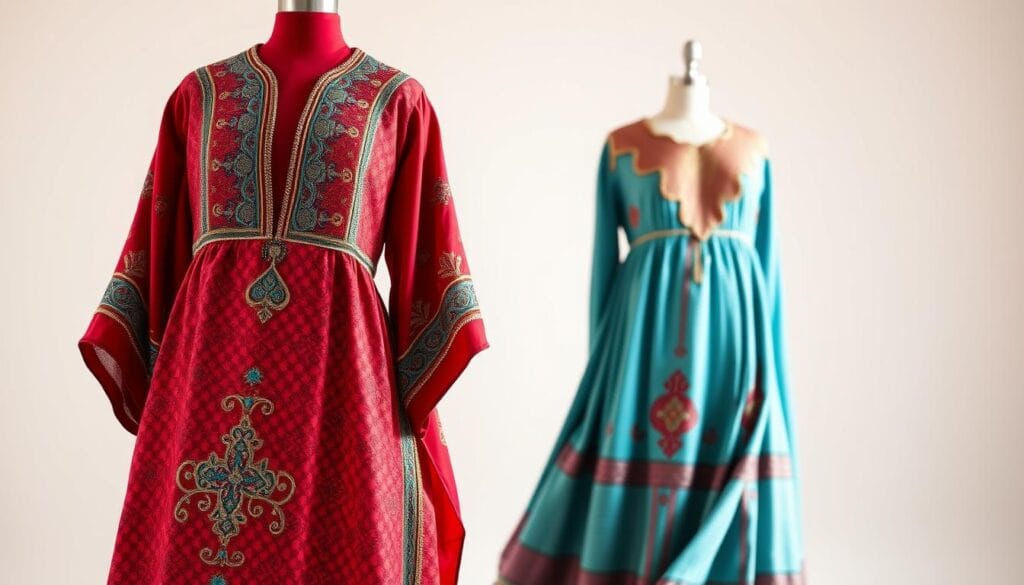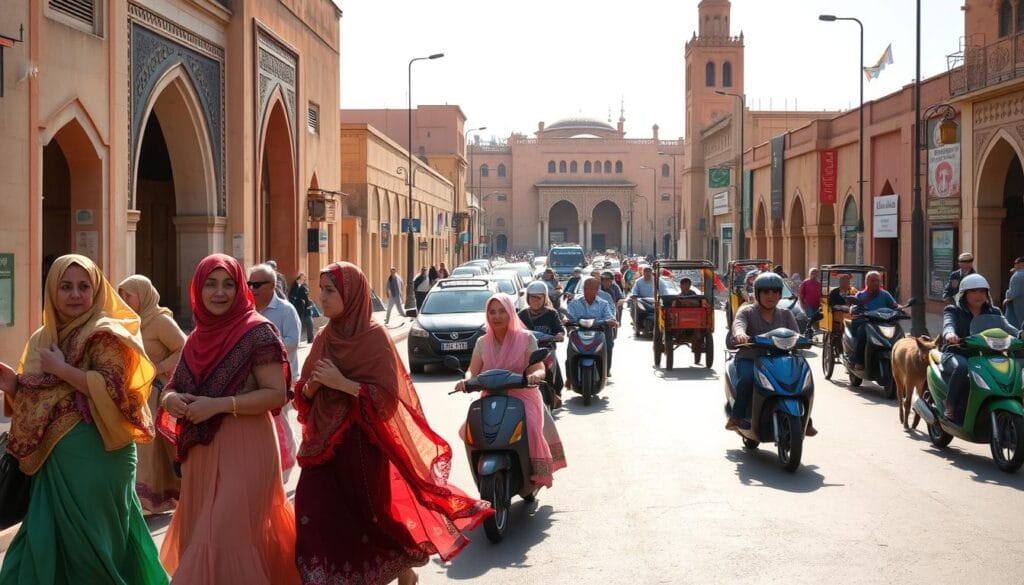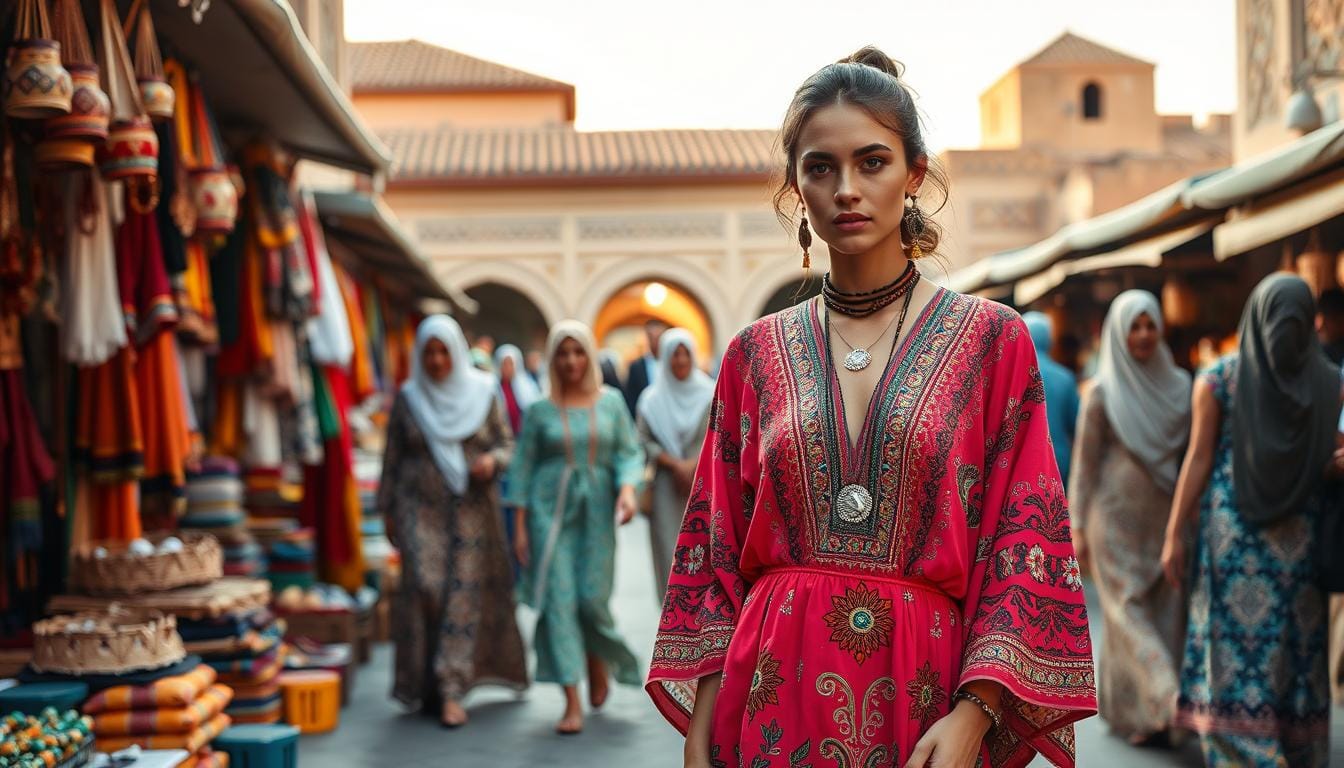Is It Safe to Travel to Morocco Right Now? Updated Guide
Is It Safe to Travel to Morocco Right Now? Planning a trip to Morocco? You might ask: Is it safe to travel there right now? Safety can change, so staying informed is key. Morocco is famous for its lively culture, rich history, and beautiful fashion. This includes Moroccan fashion for women, drawing many visitors.
This guide offers an updated look at safety, helping you decide about your trip. You’ll get tips on staying safe, areas to steer clear of, and the country’s stability. This way, your trip will be both fun and secure.
Knowing the current situation helps you prepare better. You’ll enjoy Morocco’s markets, stunning women’s wear, and cultural heritage more.
Table of Contents
ToggleOverview of Safety in Morocco
Planning a trip to Morocco? Knowing about safety is key for a great trip. Morocco is mostly safe for visitors, but it has its risks.
Is It Safe to Travel to Morocco Right Now: Current Travel Advisory Levels
It’s wise to check your government’s travel advisories before you go. These advisories give you the latest on safety in Morocco.
- Visit official government websites for the latest info.
- Sign up for your government’s travel advisory program for safety updates.
Key Areas of Concern
Morocco is big and varied, with some places safer than others. Knowing these areas helps plan your trip better.
Some areas to watch out for include:
- Border regions: Places near Western Sahara and Algeria borders might be riskier due to tensions.
- Major cities: While Marrakech and Fez are mostly safe, watch out for petty crimes like pickpocketing.
General Safety Tips
To have a safe and fun trip, follow these tips:
- Stay alert, mainly in crowded spots and tourist areas.
- Wear modest clothes, showing respect for local customs. Women might want to wear traditional Moroccan clothing or Moroccan women’s clothing.
- Keep your valuables safe and be wary of scams or overly friendly people.
By staying informed and aware, you can enjoy a safe and memorable trip in Morocco.
Political Situation and Stability
Morocco is famous for its rich culture and modern Moroccan attire. But, it also has a complex political scene. Travelers need to know about this to stay safe and have fun. The country’s politics and government affect how safe it is for visitors.
Government Structure and Current Leadership
Morocco is a constitutional monarchy. The king is the head of state. King Mohammed VI has been leading the country for over 20 years and has made many changes.
The government has three main parts: the executive, legislative, and judicial. The king and the prime minister lead the executive. The legislative has a parliament with two houses. The judicial is independent, with the Supreme Court at the top.
| Branch | Description | Key Figures |
|---|---|---|
| Executive | Headed by the King and Prime Minister | King Mohammed VI, Prime Minister |
| Legislative | Bicameral Parliament | Members of the House of Representatives and House of Councillors |
| Judicial | Independent Judiciary | Supreme Court Judges |
Recent Protests and Unrest
Morocco has seen protests about money, corruption, and fairness. The Hirak Rif movement in 2017-2018 was a big one. It started in the Rif region, asking for better jobs and less corruption.
These protests can sometimes get violent. But they usually don’t target tourists. It’s smart for visitors to keep up with local news and avoid protest areas.
Impact on Travel
The politics in Morocco can affect travel plans. If there are big protests or unrest, tourists should stay informed. Most tourist spots are safe from political troubles.
Wearing the right clothes, like modern Moroccan attire, is important. It shows respect when visiting mosques or rural areas. This can make your trip better and more enjoyable.
Health and Safety Considerations
To have a great trip to Morocco, knowing about health and safety is key. Before you go, learn about the health rules and possible dangers. This will make your trip safer and more fun.
COVID-19 Regulations and Guidelines
Morocco fights COVID-19 with strict rules. Travelers need to follow these, like wearing masks and keeping distance. Always check the latest travel advice.
Vaccination against COVID-19 is very important. Being fully vaccinated helps lower the chance of getting very sick.

Vaccination Requirements
Getting all your routine shots is also important before going to Morocco. The CDC says you should have shots for hepatitis A, B, and typhoid. Your travel plans might need more shots too.
| Vaccination | Recommendation |
|---|---|
| Hepatitis A | Recommended for all travelers |
| Hepatitis B | Recommended for travelers who may engage in high-risk activities |
| Typhoid | Recommended for most travelers, specially those staying with locals or eating local food and water |
Common Health Risks
Morocco’s weather and places can be risky for health. Be careful in the desert to avoid heat sickness and drink lots of water. Also, watch out for bugs that can spread diseases like leishmaniasis in some places.
When buying beautiful moroccan dresses for women, stay alert and keep your things safe. Pickpocketing is a problem in tourist spots.
Knowing about health and safety lets you enjoy Morocco more. You can explore markets, wear traditional clothes, and see the country’s stunning nature.
Local Laws and Culture
Before you visit Morocco, learn about the local laws and cultural norms. Morocco has a rich culture and laws influenced by Islamic law and French traditions.
Understanding Moroccan Laws
Moroccan laws are based on the country’s constitution and Islamic law. It’s important to know these laws to avoid trouble during your trip. For example, public displays of affection are generally frowned upon.
Also, activities like hiking in the Atlas Mountains or exploring the Sahara Desert might need special permits or guides. Always check with local authorities or your tour operator about any rules.
Respecting Cultural Norms
Morocco is a conservative country. It’s important to respect local customs. For instance, when visiting mosques or rural areas, you should dress modestly and remove your shoes when necessary.
The Moroccan hijab fashion shows modesty and elegance. While you don’t have to wear a hijab, dressing modestly is appreciated.
Dress Code Recommendations
Dressing modestly is key in Morocco. For women, this means covering your shoulders and knees. Lightweight, loose-fitting clothing is best for Morocco’s climate. You can add a scarf or shawl to cover up when needed.
- Cover your shoulders and knees.
- Avoid tight or revealing clothing.
- Consider packing lightweight, loose-fitting clothes.
- Bring a scarf or shawl to cover up when necessary.
Crime and Personal Safety
Traveling to Morocco means being aware of possible crimes and staying safe. Knowing about local conditions can make your trip better.
Types of Crime to Be Aware Of
Morocco faces various crimes like petty theft and scams. Pickpocketing is common in tourist spots. Serious crimes like harassment and knife-point theft are rare but possible.
- Pickpocketing and bag snatching in crowded areas and markets
- Scams targeting tourists, including fake guides and overpriced goods
- Petty theft in hotels and riads
Neighborhood Safety Ratings
Neighborhoods in Morocco vary in safety. Major cities like Marrakech and Fez have safe areas for tourists. But, some places need more caution.
| City | Safe Neighborhoods | Areas to Avoid |
|---|---|---|
| Marrakech | Medina (with guides), Jemaa el-Fnaa | Isolated areas at night |
| Fez | Old Medina (with guides) | Dark alleys, isolated areas |
How to Stay Safe
To stay safe in Morocco, know your surroundings and take precautions. Here are some tips:
- Stay informed about local conditions and demonstrations
- Use reputable taxi services or ride-sharing apps
- Avoid displaying signs of wealth (e.g., expensive jewelry, watches)
- Dress modestly, respecting local customs, and visit mosques or rural areas. You can explore local markets for moroccan women’s wear to get a feel for the culture.
By knowing about crimes and taking precautions, you can have a safe and fun trip to Morocco. Always be alert and trust your instincts.
Transportation Safety
Traveling to Morocco means knowing your transportation options and their safety. Morocco has many ways to get around, each with its own safety tips.
Public Transportation Options
Morocco’s public transport includes buses, trains, and trams. These are mostly safe and work well. The ONCF train service is great for long trips, linking cities like Marrakech, Fez, and Casablanca.
For shorter trips, buses and trams are good choices. But, keep an eye on your stuff, mainly in busy places, to prevent theft.

Road Safety Precautions
Driving in Morocco can be tough because of the roads and driving styles. If you rent a car, pick a trusted company and learn the local traffic rules.
- Always wear a seatbelt.
- Avoid driving at night when possible.
- Be cautious of pedestrians and other vehicles.
Taxi and Rideshare Guidelines
Taxis are a common way to get around Morocco. For safety, use official taxi services and agree on the fare first. Rideshare apps are also available in big cities, making travel easier.
When using taxis or rideshares, remember to:
- Check the driver’s ID before you get in.
- Use reputable services.
- Share your journey details with a friend or family member when possible.
Knowing these safety tips will help you have a safer and more fun trip to Morocco.
Natural Disasters and Environmental Risks
Planning a trip to Morocco? It’s key to know about the natural disaster risks. Morocco has mountains, deserts, and coastlines along the Atlantic and Mediterranean. This mix makes it prone to different natural hazards.
Earthquake Considerations
Morocco is in a seismically active area, so earthquakes can happen. Big earthquakes, like the 2004 Al Hoceima one, have hit before. While predicting earthquakes is impossible, being ready is vital. Learn the evacuation plans and emergency exits, mainly in hotels or areas at risk.
Tips for Earthquake Preparedness:
- Stay updated on local seismic activity.
- Know the emergency exit routes in your accommodation.
- Join in earthquake drills if they’re available.
Weather-Related Risks
Morocco’s weather changes a lot from north to south and coast to interior. It faces extreme weather, like heatwaves, droughts, and floods. Knowing these risks helps you get ready for your trip.
Regional Weather Patterns:
- The coastal areas have milder climates.
- The Atlas Mountains have cold winters and mild summers.
- The Sahara Desert is hot and dry, with big temperature swings.
Best Seasons for Travel
Choosing the best time to visit Morocco depends on what you like and plan to do. Spring (March to May) and autumn (September to November) are the best, with nice weather and fewer people.
Seasonal Highlights:
- Spring: See flowers blooming and enjoy the weather.
- Autumn: Enjoy the weather and the harvest season.
- Winter: Ski and snowboard in the mountains.
- Summer: Cool off in coastal towns and enjoy beaches.
Think about the season and your plans when packing. Wearing traditional Moroccan clothing is a good idea. It’s respectful and practical, mainly in rural areas or cultural spots.
Tips for Female Travelers
Traveling to Morocco as a woman means understanding the local culture and customs. Morocco is known for its vibrant culture and rich history. It can be a fascinating place for female travelers. But, it’s important to be ready for the unique challenges women might face in this conservative country.
Navigating Cultural Expectations
Morocco is a conservative country with strong cultural and religious traditions. As a female traveler, dressing modestly is key to avoid unwanted attention and show respect. Moroccan women’s clothing often includes long garments and headscarves, which can inspire your travel wardrobe. Pack clothes that cover your shoulders and knees.
When visiting mosques or rural areas, dressing conservatively is vital. You might also want to wear a scarf to cover your hair as a sign of respect. Understanding and following these cultural norms can greatly improve your travel experience.
Solo Travel Safety Tips
While Morocco is generally safe for solo female travelers, it’s wise to be cautious. Avoid traveling alone at night and use reputable taxi services or ride-sharing apps. Staying in well-lit and populated areas, even in the evenings, can also boost your safety.
It’s also a good idea to stay in touch with family or friends back home and share your itinerary. Letting your hotel or accommodation know you’re traveling solo can also be helpful.
Recommended Destinations for Women
Morocco has many destinations that are great for female travelers. The bustling souks of Marrakech, the historic city of Fez, and the coastal town of Essaouira are popular spots. These places offer a mix of culture, history, and relaxation, and are welcoming to women travelers.
In Marrakech, exploring the Majorelle Garden, created by French artist Jacques Majorelle, can be a serene experience. In Fez, navigating the ancient medina can be an adventure, with its narrow streets and vibrant markets. Essaouira, with its laid-back atmosphere and beautiful beaches, is perfect for those looking to unwind.
Emergency Contacts and Resources
Having the right contacts and resources is vital in Morocco. It can save your life in an emergency. Being ready for any situation is key.
Local Emergency Numbers
Morocco has emergency numbers for different services. Here are the ones you need to know:
- Police: 19
- Fire Department: 15
- Ambulance/ Medical Emergencies: 15
Remember to also have your country’s embassy or consulate contact info handy.
U.S. Embassy Information
For U.S. citizens, the U.S. Embassy in Rabat is essential. You can call them at +212 (0) 537-63-7200 or visit their website. They offer help with emergencies, passports, and more.
Useful Travel Apps
Travel apps can make your trip to Morocco better. They provide useful info and help. Here are some top picks:
- Google Translate: Helps you talk to locals.
- Mappy: A great GPS app.
- Morocco Guide: Gives insights on places and culture.
When in Morocco, dressing modestly is a sign of respect. Knowing about modern Moroccan attire helps you fit in. For women, a scarf is useful for covering your shoulders or head.
Being informed and prepared makes your trip to Morocco safer and more fun.
Conclusion: Is It Safe to Visit Morocco?
Thinking about visiting Morocco? It’s key to balance safety concerns with the country’s rich culture. Morocco boasts vibrant markets, stunning architecture, and beautiful traditional clothes. This includes stunning moroccan dresses for women and elegant moroccan hijab fashion.
Key Takeaways
You now know about Morocco’s safety situation. This includes general safety tips, health considerations, and laws to follow. The country’s stability, crime rates, and natural disaster risks have been discussed to help you prepare.
Final Travel Tips
To have a smooth trip, stay updated on local conditions and respect cultural norms. Also, take steps to avoid petty crime. Enjoy the bustling souks, try local food, and admire the beautiful traditional attire, including the detailed moroccan hijab fashion.
Exploring Morocco
Morocco welcomes visitors with open arms. As you explore its cities, landscapes, and heritage, you’ll see why it’s loved by travelers. With the right preparation and awareness, you can have a safe and enriching visit to this beautiful country.

